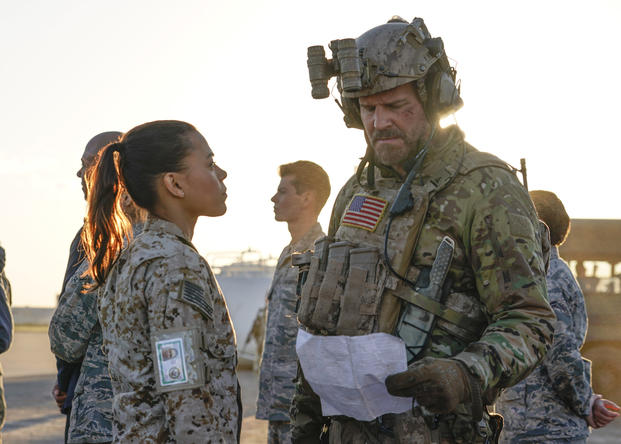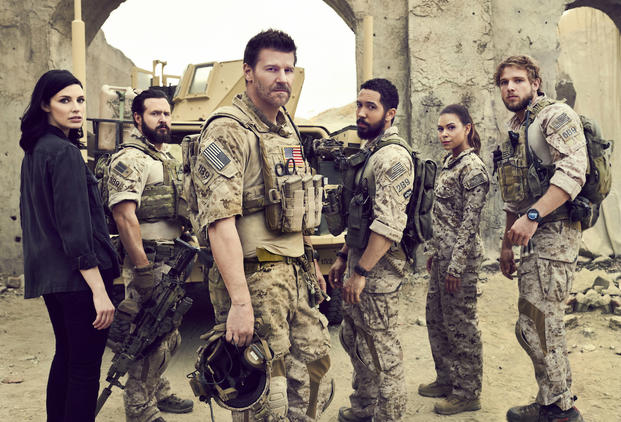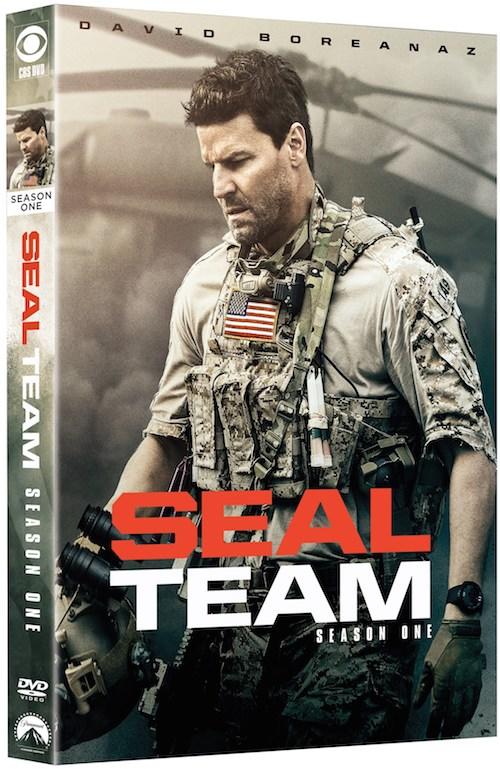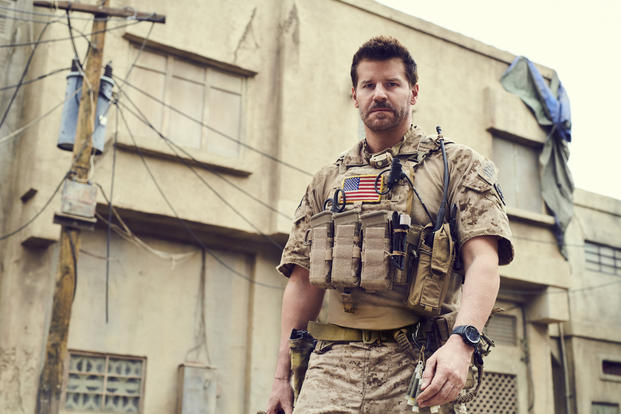"SEAL Team" is the last show standing after a the flood of military series launched in the wake of "American Sniper." That's not really a surprise, since the cast and crew managed to find the right balance between mission and family, nailing the action and giving insight into the personal struggles that operators face.
The show was a big hit for CBS last season and Season Two premieres on October 3rd. Season One is out on DVD this week and series star David Boreanaz took the time to talk about the show with us.
Boreanaz has enjoyed a long an impressive run over the last two decades, starting with his lead role in the "Buffy the Vampire Slayer" spinoff "Angel," continuing with a long run as FBI agent Seeley Booth on "Bones" and rolling straight into "SEAL Team" last year. He's got a massive fan base, including your grandma who never missed "Bones" and a couple of generations who have streamed "Buffy" and "Angel" on Netflix or Hulu. CBS knows how to make shows like "SEAL Team" and David seems set for another long network run.
The show also features Jessica Paré ("Mad Men") as the team's CIA analyst and Michaela McManus ("Law & Order: SVU") as Jason's wife Alana. Ray Perry ("Straight Outta Compton"), A.J. Buckley ("Justified"), Max Theriot ("Bates Motel") and Tyler Grey (real-life Army Ranger and one of the show's producers) round out the team, while Toni Trucks ("NCIS: New Orleans") features as the team's logistics officer.
Congratulations on the show. We've covered a lot of military dramas on our site over the last couple of years and yet yours is the one that connected with people. So what do you think it is about "SEAL Team" that resonates with an audience?
They know we're staying true to what we were trying to do here. Every scene that we did last season was difficult. And when I say difficult, it was a challenge to get over adversities and a challenge to make it right and not just gloss over the fact of what they were doing. We didn't want to make it look easy, but show how challenging it is.
RELATED:
We make an effort to do things correctly. We have veterans like Tyler Grey involved on the show. Their involvement itself was such a blessing that we didn't take anything for granted. It was a lot of hard work, but I think it was worth it because here we are talking about season two. That's kind of amazing. We created such a strong brotherhood on set with all the characters that carried off the set, and I think that really helped with the bond as well.

So I was talking to my 19-year-old daughter this morning and she's a big fan of "Angel." We realized that you've been a lead character on TV every single season for her entire life. That's an incredible accomplishment.
I just go to work and go to work and come home blessed. I just focus on the scenes and not like what's going to happen tomorrow or next week or next year. I just work within the confines of what the moment of the scene is all about. And I guess it just added up, huh? Hey, there we are. I don't know.

Tyler Grey spoke with us last year right before the show went on the air. What is the training like for you and what's the mechanics like of working with professional guys? How you actually put it together when you're making the show?
Let's just break it down into two versions. As far as making a show for a television audience was concerned, it's a great balance between the military world and the family world. I hone in on the character, I hone in on the characteristics of that character, I hone into everything that he can bring and fill his boots with what I can bring.
To me, the family aspect of it is so huge, the brotherhood and the military aspect of when they're working,. Their lives outside of that are even more important because that's the story that we want to tell. We want to show how they relate to their family and how they get through things and deal with what people don't see.
The military aspect of it is a totally different animal. We go and we shoot the operations and the missions. We'll rehearse it. Whatever we're working with, we go through it. Tyler is there. We go through dialogue, we adjust dialogue moments before we shoot. Does this work, does it look right?
We're constantly going over body placements, how to make an approach. I've gotten a lot of feedback from some military guys: "Yeah, you're holding your gun wrong, you gotta get your shoulder down more." So I take all that in and I work with Tyler more. Our goal this year is to hone in on that. You take your greatest weakness and you want to make it better because you're trying to depict something accurately.
It's a very painstaking process (in a good way, I would say) and we get it right that way. We don't just go in and say, "Oh, here they come through a hallway and they pounce down a door and they're kicking doors down and they're taking the enemy by surprise." We just don't shoot it that way. If it's written on paper, there's steps to the scene and we have to be very accurate when we execute them.
It's a thought process and that thought process takes a little time, but when we shoot, it's done. And it's done quickly and it's done efficiently and it's done right. So we take the time before and then we crush it, and we crush pages. We just go and crush when it comes to those types of missions and operations.
And it hurts the body. It's not easy. I was talking to my niece out here and she said, "You know what, you're basically an athlete trying to maintain himself in a professional sport right now. You're the oldest athlete in your sport." And I looked down and I said, "You're absolutely right because my muscles are feeling it." You feel that, that low crouch or that crawl, whatever that is, from your fingertips to your toes. And if you feel that, you've got to be doing something right.

A lot of shows that concentrate on the ops often do a really bad job developing individual characters and their family relationships. The balance between the two seems to be a real strength of your show. What kind of feedback have you gotten from people about the betrayal of military families on "SEAL Team?"
Fantastic. There's just a remarkable feedback. Going into season two, we're onto shooting our third episode already. It's going to be emotional the first half of the season, because we examine how the team comes back. They have to really find resolve inside of themselves in order to come to grips with what they're dealing with, in order to come back home and still be effective as a team together.
The response we've gotten from season one was remarkable. People are coming up to us and saying how much they enjoy that aspect of it, how they can relate to certain situations that we've portrayed. It is a military show, and there are some clichés that can go with that. We try to include the real moments. I'm working on a scene now from episode 5. It's a big military scene, but there's got to be the heart behind it so I can find that aspect of what Jason has to do. As I go through the process, I talk to Tyler about it, I talked with guys who have been in this position or I talk to people that have had something like this happen to them.
We're talking about lives that are lost and it's a very hard subject matter to portray, but we want to get it right. And if we want to get it right, then we have to show that in a correct way. I feel the writers do that, I feel [showrunner] Chris Chulack shoots that way and he's very keen on that, from the moment we started. We want to make sure that the people are involved. And that's what the heart is all about.

I've talked to people who watch the show as a family drama and don't normally care about action shows. Someone described it as "This is Us" with guns in the background.
Obviously it's a workplace show that's based upon the best Tier One Operators in the world. I mean if you're going up against the SAS or whatever that may be or other European Tier One Operators, they all work together, but these are the best of the best.
Within that, you have to show their vulnerability, you have to show their relationships, the indiviudal characters. That's the balance. We can go in and flash all the pomp and circumstances with all the gear and all the night vision goggles. All that stuff is, I hate to say it, but it's cool, right? "I love that kit" or "I like the helmet." To me, that's just like icing. When we work those scenes, we have to do them properly, but, at the same time, it's what's behind it that is pushing the characters forward. What are they dealing with and what are their conflicts inside and how do they have to put that aside and focus?
I keep going back to the idea that it's "ER" all over again, but in the military setting. That is also relevant to a "This Is Us" family environment. There are a lot of components going on and we're excited to break this new ground with season two and open it up even more.
You just gave every other military show a roadmap to fix what they're doing wrong.
Well, you know what, we all learn. Listen, we're just a vessel and we learn every day. And where shows may have come short, there's a lot of respect from us as far as the challenge of doing a show like that and knowing that everyone wants to get it right. There are times when we fall down too and we gotta pick ourselves back up. We do also want to get it right because we take the time to do it right.






